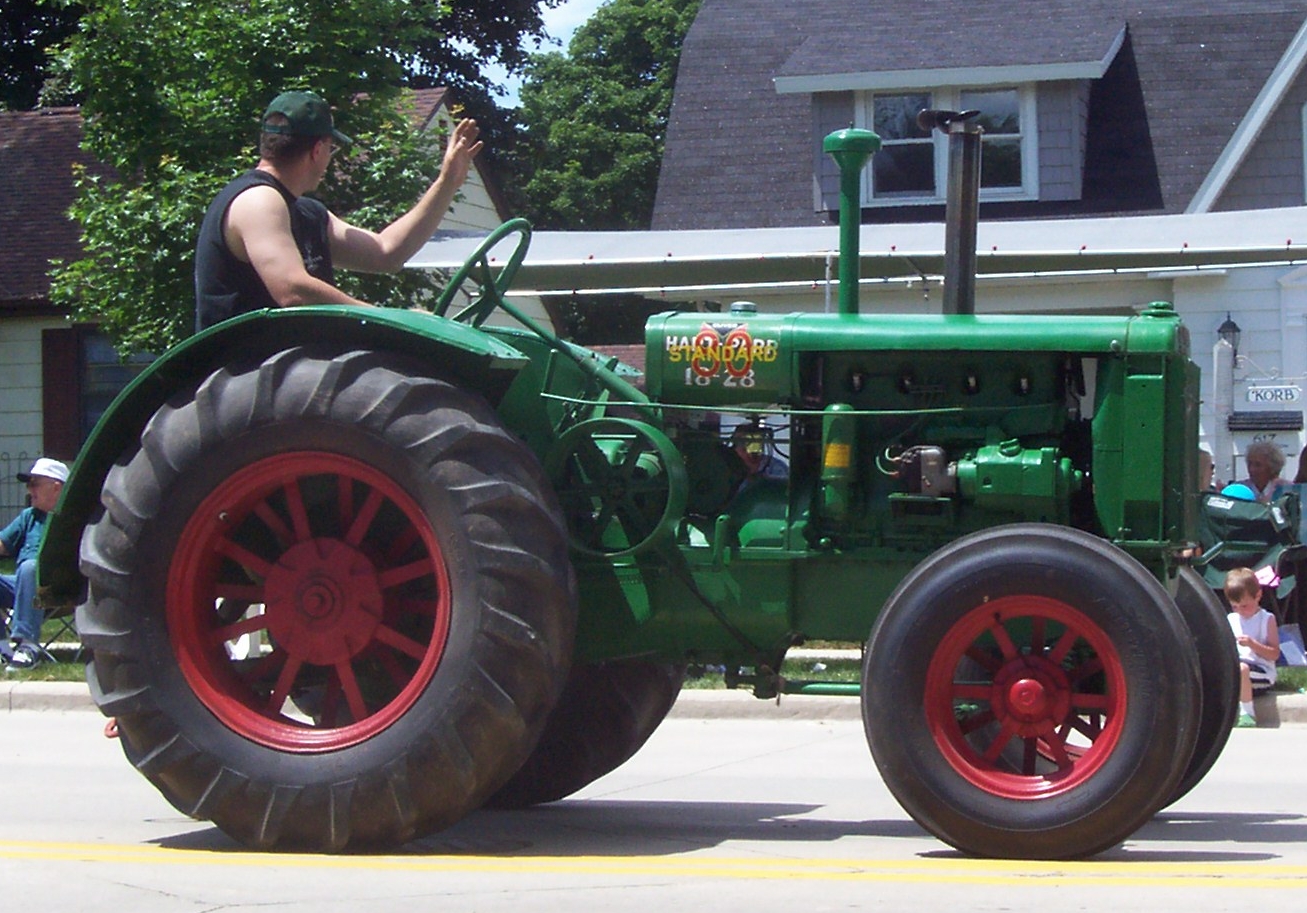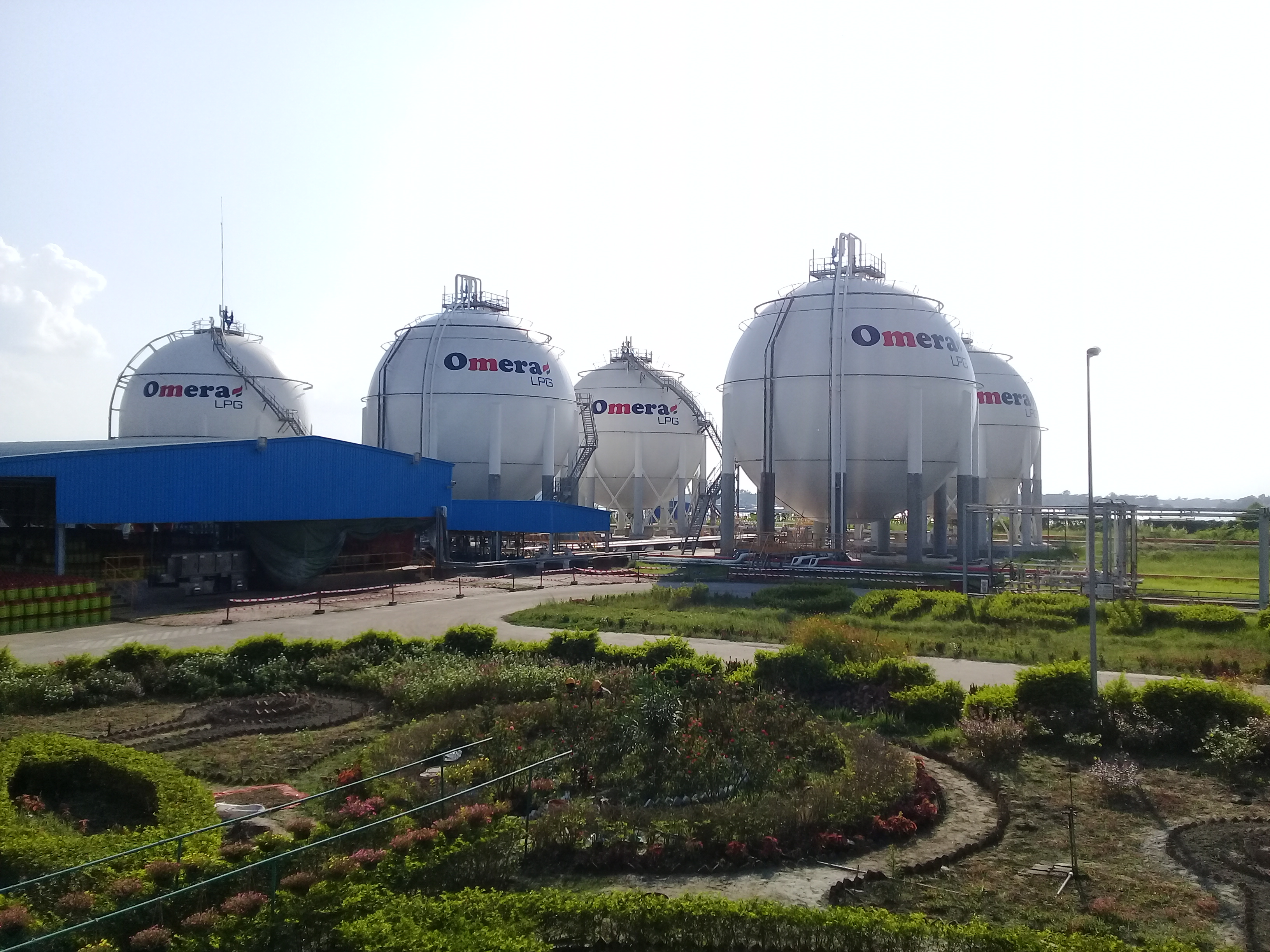|
Oliver 660
The Oliver 60 series of row-crop tractors was a product line of agricultural tractors produced from 1940 to 1964 by the Oliver Farm Equipment Company. The 60 series was a four-cylinder follow-on to the six-cylinder Oliver 70. As the 70 was outsold by the less-expensive Farmall A, Allis-Chalmers Model B and John Deere Model B, Oliver introduced the 60 to compete. The 60 was followed by the Oliver 66, Super 66 and 660, each with incremental changes and upgrades, and was produced until 1964. Description The Oliver 60 was introduced in 1940 as a less expensive alternative to the 70. The 60 was equipped with a four-cylinder engine, developing , with a four-gear transmission. The 60 inherited the 70 Fleetline's styling, with fully enclosed bodywork and a swept-back radiator grille. Versions were produced for row crops with narrow front wheels, standard models with a wide front axle, and an industrial version. Engines could be obtained for gasoline or kerosene/distillate fuels. Product ... [...More Info...] [...Related Items...] OR: [Wikipedia] [Google] [Baidu] |
Oliver Farm Equipment Company
The Oliver Farm Equipment Company was an American farm equipment manufacturer from the 20th century. It was formed as a result of a 1929 merger of four companies: the American Seeding Machine Company of Richmond, Indiana; Oliver Chilled Plow Works of South Bend, Indiana; Hart-Parr Tractor Company of Charles City, Iowa; and Nichols and Shepard Company of Battle Creek, Michigan. On November 1, 1960, the White Motor Corporation of Cleveland, Ohio, purchased the Oliver Farm Equipment Company. Merger Four companies merged on April 1, 1929, to form the Oliver Farm Equipment Company: The Oliver Chilled Plow Company, dating from 1855; the Hart-Parr Tractor Company from 1897, and the American Seeding Machine Company and Nichols and Shepard Company, both dating from 1848. By 1929, each of these companies had reached a point where continuing operations independently would not be feasible. For most of them, the market had some time earlier reached a saturation point, and in some in ... [...More Info...] [...Related Items...] OR: [Wikipedia] [Google] [Baidu] |
Oliver 70
The Oliver 70 series of row-crop tractors was a series of large agricultural tractors produced from 1935 to 1967 by the Oliver Farm Equipment Company. Oliver tractors were known for their powerful engines compared to competitors, and their attention to styling. The Oliver Hart-Parr 70 marked the beginning of a strikingly-styled series of tractors that were produced under both the Oliver and the Cockshutt names. Oliver's emphasis on styling strongly influenced offerings by competing brands such as Farmall and John Deere. As was the case with most tractor brands of the 1940s and 1950s, tractor offerings were incrementally upgraded under a series of names for essentially the same machine, with changes in styling and the addition of features and power. The 70 was progressively rebranded as the 77, Super 77 and 770 through its life. Oliver Hart-Parr 70 The Oliver Hart-Parr 70 was introduced in 1935, with emphasis on the "Oliver" brand. The 70 featured an unprecedented six-cylinder en ... [...More Info...] [...Related Items...] OR: [Wikipedia] [Google] [Baidu] |
Farmall A
The Farmall A is a small one-plow row crop tractor produced by International Harvester under the Farmall brand from 1939 to 1947. The tractor was popular for its set of innovative features in a small, affordable implement. It succeeded the Farmall F-14. The A was incrementally updated with new model numbers as the Super A, 100, 130 and 140, but remained essentially the same machine. Like the smaller Farmall Cub, the Farmall A features a distinctive offset engine, displaced to the left over wide-set front wheels, to allow vision straight ahead. An International Harvester C113 4-cylinder in-line engine was used for early models, increased to an IH C123 with the A-1. The most significant change was the introduction of hydraulics with the Super A. The series was produced until 1973. Description and production Styled by Raymond Loewy, it was one of International Harvester's " letter series", with 117,522 produced over the 8-year run, replacing the Farmall F-14. The A was rated for ... [...More Info...] [...Related Items...] OR: [Wikipedia] [Google] [Baidu] |
Allis-Chalmers Model B
The Allis-Chalmers model B was a small agricultural tractor produced by the Allis-Chalmers Manufacturing company from 1937 to 1957. With over 125,000 units produced, the model B became one of the best selling and longest-produced tractors for Allis-Chalmers. The B came in several different variations including the Asparagus B, Potato Special, and the IB industrial tractor, and gave rise to the larger Allis-Chalmers Model C. The Model B was styled by Brooks Stevens, an industrial designer and graphic designer. Description and production In the early 1930s, Allis-Chalmers tractor division manager Harry Merritt's study of farm census figures showed that, of the nearly seven million farms in America, some four million were of or less. Furthermore, the million or so tractors used on American farms were generally unsuitably large for such acreage. Although the Fordson tractor and then the first-generation row-crop tractors, including the Farmall, Allis-Chalmers's own Model WC ... [...More Info...] [...Related Items...] OR: [Wikipedia] [Google] [Baidu] |
John Deere Model B
The John Deere Model B tractor was a two-plow row-crop tractor produced by John Deere from 1935 to 1952, with direct successors produced until 1960. The B was a scaled-down, less expensive version of the John Deere Model A. It was followed by the updated 50, 520 and 530 models. Description and production The B was first produced in 1935. It was a general-purpose row-crop tractor, less expensive than the Model A at about two thirds the A's size. As with most row-crop tractors, the spacing between the rear wheels could be adjusted to suit row spacings, and the front wheels were offered with wide and narrow wheel arrangements. The B could work two plows. The tractor was equipped with a two-cylinder side-by-side engine, of displacement. Both gasoline and kerosene-fueled versions were available. The BN, a single front wheel version, was introduced in 1935, together with a wide front axle version, the BW. The BR standard tread tractor was introduced in 1936 as well, with fixed axle ... [...More Info...] [...Related Items...] OR: [Wikipedia] [Google] [Baidu] |
Distillate (motor Fuel)
Distillate fuel, also called tractor fuel, was a petroleum product that was commonly used to power North American agricultural tractors in the early and mid-twentieth century. The product was crudely refined, akin to kerosene chemically, but impure. Characteristics North American distillate is broadly described as a fuel with heavier molecular weight than gasoline, and similar to or lighter than kerosene or No. 1 fuel oil. However, both usage of the term and formulation of the product varied widely. Octane ratings varied similarly, between 33 and 45. Usage Early railroad motor cars and tractors were offered with kerosene or gasoline-powered engines. Beginning in 1925, distillate-powered versions were offered, persisting until 1956, when the last "all-fuel" tractors were sold, while diesel-fueled tractors increased in popularity. Kerosene-engined tractors were phased out by 1934. Distillate fuel was used in machines with specific provisions for distillate, as well as all-fuel trac ... [...More Info...] [...Related Items...] OR: [Wikipedia] [Google] [Baidu] |
Charles City, Iowa
Charles City is a city in and the county seat of Floyd County, Iowa. Charles City is a significant commercial and transportation center for the area. U.S. Routes 18 and 218, Iowa Highway 14, and the Canadian National and Canadian Pacific railroads serve the city. The population was 7,396 at the time of the 2020 census, a decrease of 5.3%, from 7,812 in 2000. History The Ho-Chunk people, also known as Winnebago, had long occupied this area and had a village along the Cedar River. In 1851 Joseph Kelly, the first-known European-American settler in the area, came here after the Ho-Chunk had been pushed out. He believed that the site was ideal for a town, as it had water from the Cedar River and adjacent timberland to supply building needs. The settlement was first called "Charlestown" after his son. By 1852, twenty-five other settler families had joined Kelly. The town name was changed, first to "St. Charles" and then to "Charles City," to avoid duplication of other Iowa town ... [...More Info...] [...Related Items...] OR: [Wikipedia] [Google] [Baidu] |
Oliver 66 Tractor MD3
Oliver may refer to: Arts, entertainment and literature Books * ''Oliver the Western Engine'', volume 24 in ''The Railway Series'' by Rev. W. Awdry * '' Oliver Twist'', a novel by Charles Dickens Fictional characters * Ariadne Oliver, in the novels of Agatha Christie * Oliver (Disney character) * Oliver Fish, a gay police officer on the American soap opera ''One Life to Live'' * Oliver Hampton, in the American television series ''How to Get Away with Murder'' * Oliver Jones (''The Bold and the Beautiful''), on the American soap opera ''The Bold and the Beautiful'' * Oliver Lightload, in the movie ''Cars'' * Oliver Oken, from ''Hannah Montana'' * Oliver (paladin), a paladin featured in the Matter of France * Oliver Queen, DC Comic book hero also known as the Green Arrow * Oliver (Thomas and Friends character), a locomotive in the Thomas and Friends franchise * Oliver Trask, a controversial minor character from the first season of ''The O.C.'' * Oliver Twist (characte ... [...More Info...] [...Related Items...] OR: [Wikipedia] [Google] [Baidu] |
LP Gas
Liquefied petroleum gas (LPG or LP gas) is a fuel gas which contains a flammable mixture of hydrocarbon gases, specifically propane, propylene, butylene, isobutane and n-butane. LPG is used as a fuel gas in heating appliances, cooking equipment, and vehicles. It is increasingly used as an aerosol propellant and a refrigerant, replacing chlorofluorocarbons in an effort to reduce damage to the ozone layer. When specifically used as a vehicle fuel, it is often referred to as autogas or even just as gas. Varieties of LPG that are bought and sold include mixes that are mostly propane (), mostly butane (), and, most commonly, mixes including both propane and butane. In the northern hemisphere winter, the mixes contain more propane, while in summer, they contain more butane. In the United States, mainly two grades of LPG are sold: commercial propane and HD-5. These specifications are published by the Gas Processors Association (GPA) and the American Society of Testing and Materi ... [...More Info...] [...Related Items...] OR: [Wikipedia] [Google] [Baidu] |
Oliver Tractors
Oliver may refer to: Arts, entertainment and literature Books * ''Oliver the Western Engine'', volume 24 in ''The Railway Series'' by Rev. W. Awdry * '' Oliver Twist'', a novel by Charles Dickens Fictional characters * Ariadne Oliver, in the novels of Agatha Christie * Oliver (Disney character) * Oliver Fish, a gay police officer on the American soap opera ''One Life to Live'' * Oliver Hampton, in the American television series ''How to Get Away with Murder'' * Oliver Jones (''The Bold and the Beautiful''), on the American soap opera ''The Bold and the Beautiful'' * Oliver Lightload, in the movie ''Cars'' * Oliver Oken, from ''Hannah Montana'' * Oliver (paladin), a paladin featured in the Matter of France * Oliver Queen, DC Comic book hero also known as the Green Arrow * Oliver (Thomas and Friends character), a locomotive in the Thomas and Friends franchise * Oliver Trask, a controversial minor character from the first season of ''The O.C.'' * Oliver Twist (characte ... [...More Info...] [...Related Items...] OR: [Wikipedia] [Google] [Baidu] |




.jpg)
